Linguistic profiling of text genres: adventure stories vs. textbooks
In this article we test the hypothesis that genre-inherent quantitative linguistic parameters can be reduced to a list of few provided with strictly defined ranges of value. The current research as part of a large project is aimed at contrastive analysis of textbooks on History and Social Studies, and adventure stories. Using RuLingva[1], we identified 18 genre variables, computed their frequencies and employed the Kruskal-Wallis H Test to evaluate the differences significance. The results suggest that the list of the most indicative parameters include sentence length, noun genitive case, future tense, ratio of verbs to nouns, provisionally called ‘narrativity’, and frequency. All the identified parameters have statistically significant differences and three of them (sentence length, genitive noun, and “narrativity”) are implemented in non-overlapping “genre-inherent” ranges of values attributed to (a) History and Social studies textbooks and (b) adventure stories. With the view that the target audience of adventure stories are not expected to demonstrate high levels of professional training but logical skills, we argue that the relatively stable readability of adventure stories, i.e. FKGL = 8-9, can also be attributed to the genre-inherent characteristics. Our results certify that incorporating text complexity indices improve the classification performance of genre quantitative analysis. We also offer our views on linguistic and statistical aspects of the proposed approach for future studies. Further research is needed to see how the same parameters are exploited in texts of other genres and subject domains.
Figures
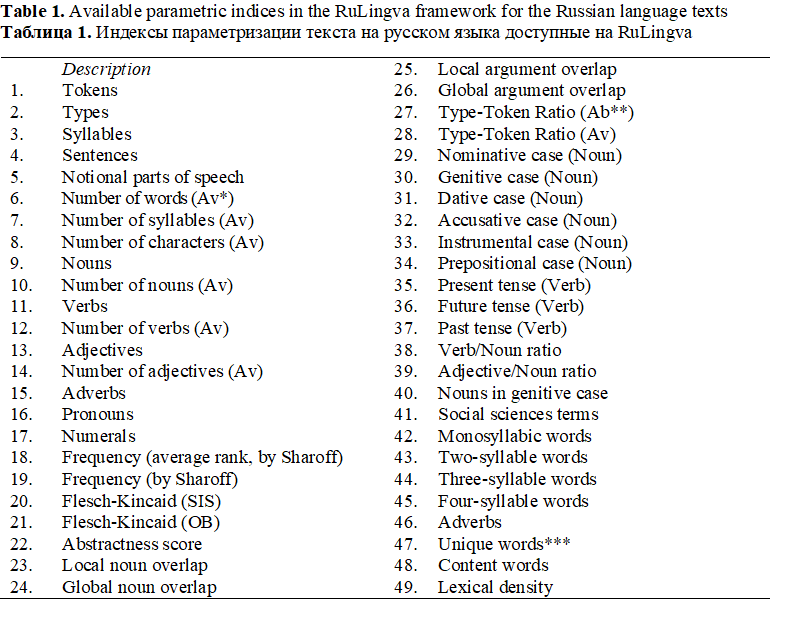

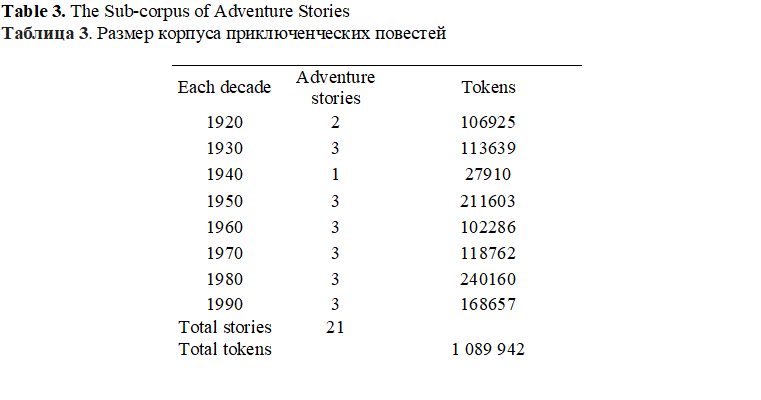
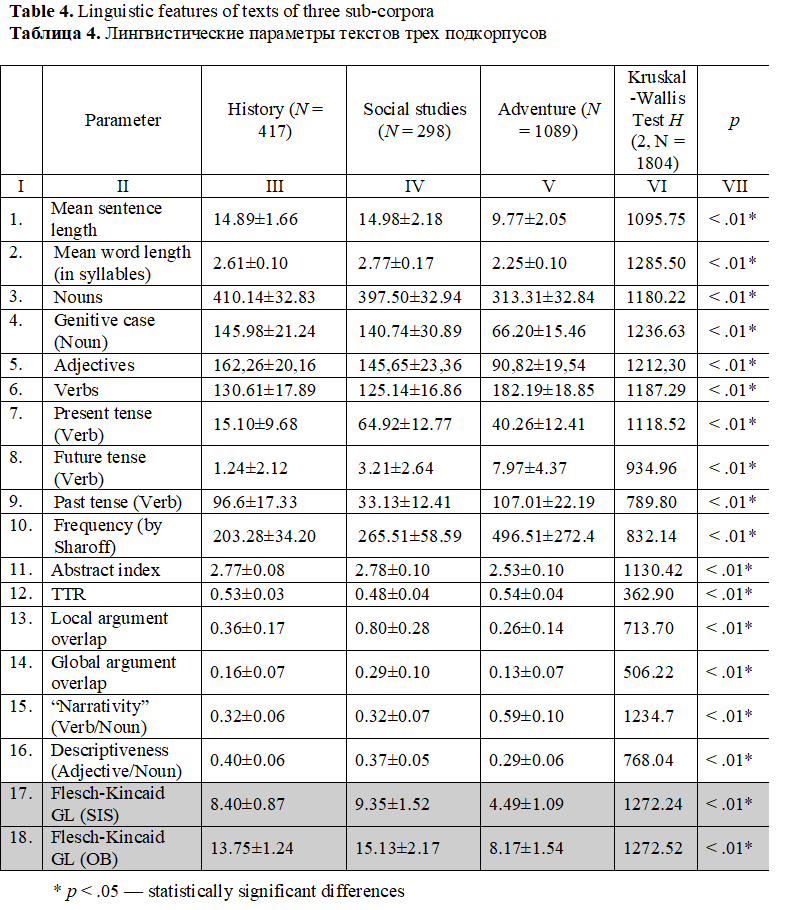

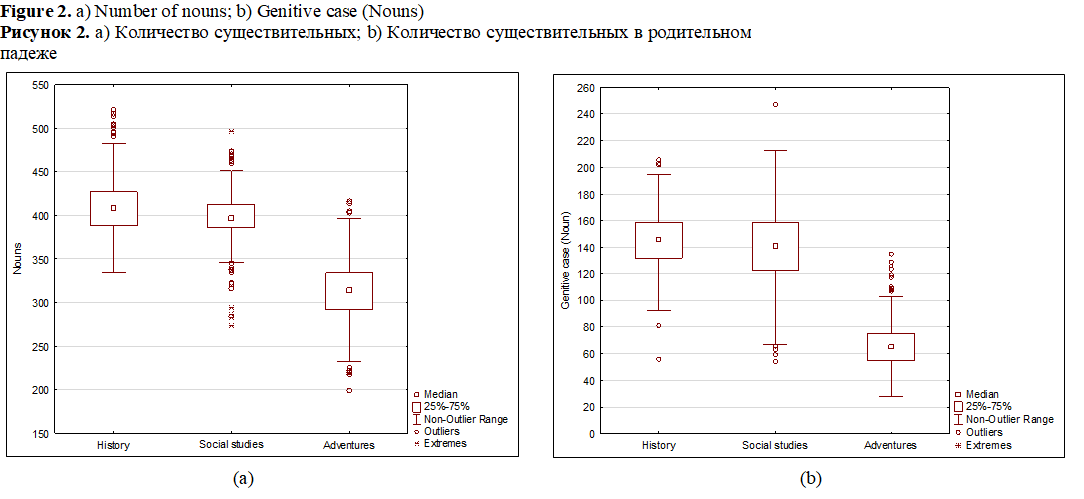

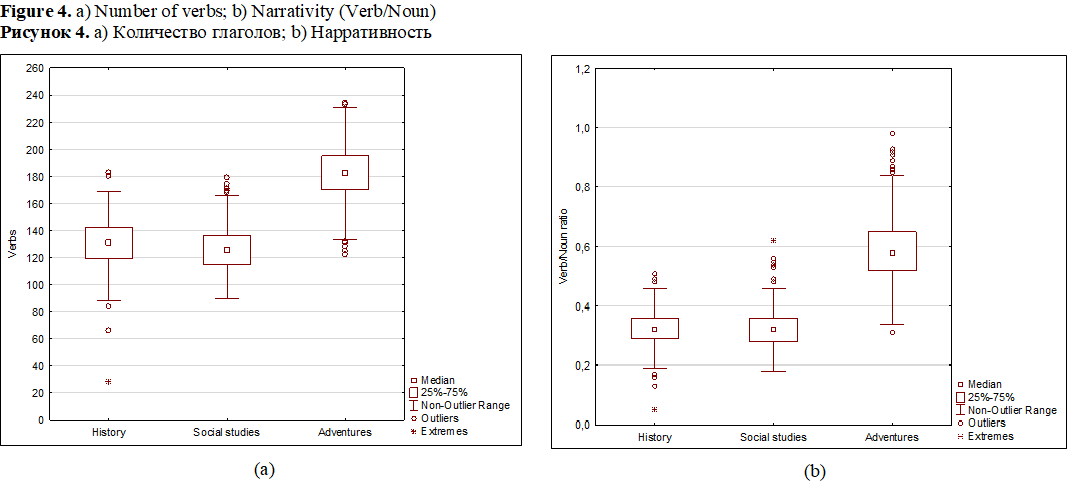

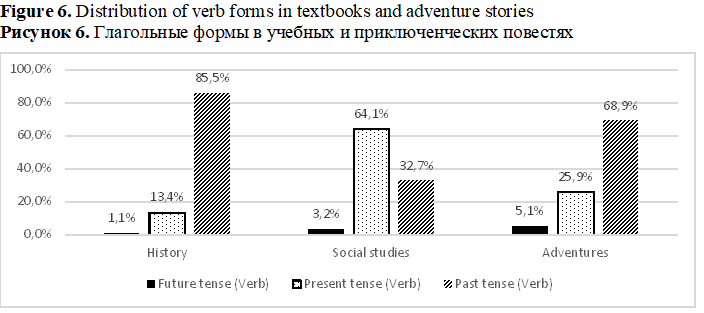
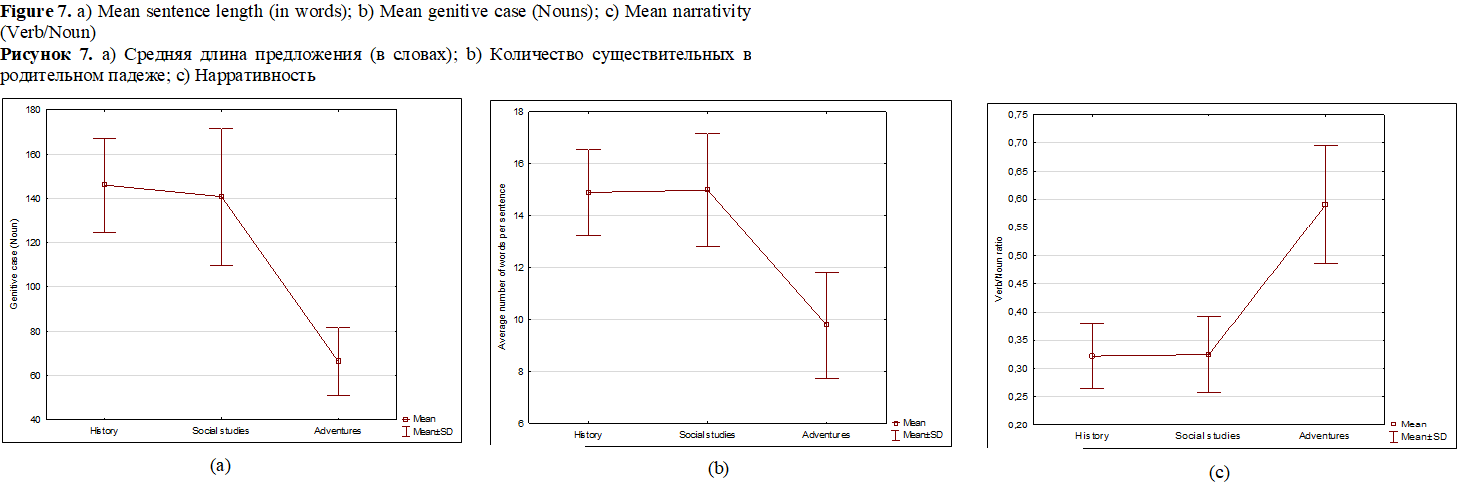
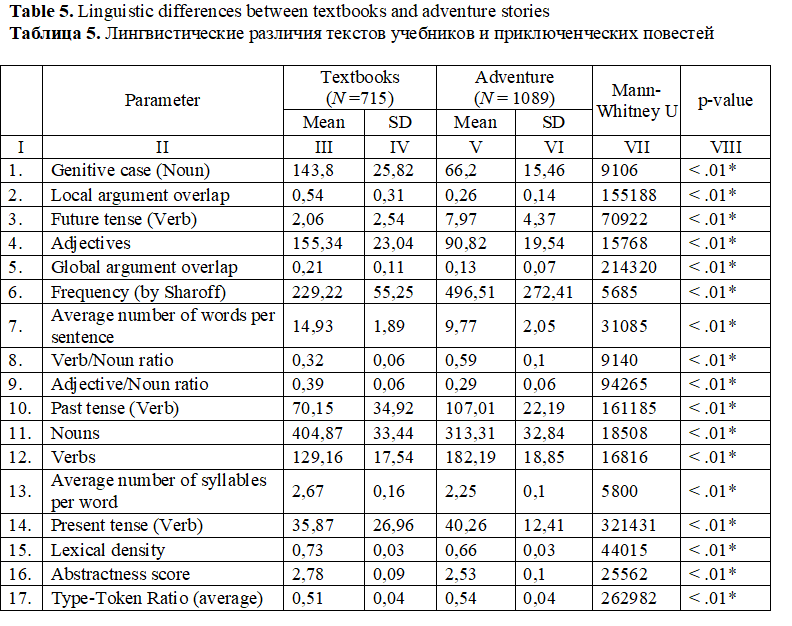
Solnyshkina, M. I., Kupriyanov, R. V. and Shoeva, G. N. (2024). Linguistic profiling of text genres: adventure stories vs. textbooks, Research Re-sult. Theoretical and Applied Linguistics, 10 (1), 115-132. DOI: 10.18413/2313-8912-2024-10-1-0-7


















While nobody left any comments to this publication.
You can be first.
Bakhtin, M. M. (1975). Voprosy literatury i estetiki [Issues of literature and aesthetics], Moscow, Russia. (In Russian)
Biber, D. (1986). Spoken and Written Textual Dimensions in English: Resolving the Contradictory Findings, Language, 62 (2), 384–414. https://doi.org/10.2307/414678(In English)
Biber, D. (1988). Variation across Speech and Writing, Cambridge University Press, Cambridge, UK. (In English)
Brine, J. J. (1986). Adult readers in the Soviet Union, Abstract of Ph.D. dissertation, University of Birmingham, Birmingham, UK. http://etheses.bham.ac.uk//id/eprint/1398/(In English)
Dell’Orletta, F., Montemagni, S. and Venturi, G. (2013). Linguistic Profiling of Texts Across Textual Genre and Readability Level. An Exploratory Study on Italian Fictional Prose, Proceedings of the Recent Advances in Natural Language Processing Conference (RANLP-2013), Hissar, Bulgaria, 189-197. (In English)
Dralyuk, B. (2011). Bukharin and the “Red Pinkerton”, The NEP Era: Soviet Russia, 1921-1928, 5, 3-21. (In English)
Galve, G. I. (1998). The textual interplay of grammatical metaphor on the nominalization occurring in written medical English, Journal of Pragmatics, 30 (3), 363–385. (In English)
Gatiyatullina, G. M., Solnyshkina, M. I., Kupriyanov, R. V. and Ziganshina, Ch. R. (2023). Lexical density as a complexity predictor: the case of Science and Social Studies textbooks, Research Result. Theoretical and Applied Linguistics, 9 (1), 11-26. https://doi.org/10.18413/2313-8912-2023-9-1-0-2(In English)
Gatiyatullina, G., Solnyshkina, M., Solovyev, V., Danilov, A., Martynova, E. and Yarmakeev, I. (2020). Computing Russian Morphological distribution patterns using RusAC Online Server, Proceedings of the 13th International Conference on Developments in eSystems Engineering (DeSE), Liverpool, United Kingdom, 393-398. https://doi.org/10.1109/DeSE51703.2020.9450753(In English)
Halteren, H. V. (2004). Linguistic Profiling for Authorship Recognition and Verification, Proceedings of the 42nd Annual Meeting of the Association for Computational Linguistics (ACL-04), Barcelona, Spain, 199-206. (In English)
Husband, W. B. (2006). Miraculous Horses: Reading the Russian Revolution through Soviet Children’s Literature, The Princeton University Library Chronicle, 67 (3), 553–594. https://doi.org/10.25290/prinunivlibrchro.67.3.0553(In English)
Hyland, K. (2009). Academic Discourse: English in a Global Context, Continuum, London, UK. (In English)
Jalilifar, A., Alipour, M. and Parsa, S. (2014). Comparative Study of Nominalization in Applied Linguistics and Biology Books, Journal of Research in Applied Linguistics, 5 (1), 24-43. (In English)
Klerides, E. (2010). Imagining the Textbook: Textbooks as Discourse and Genre, Journal of Educational Media, Memory, and Society, 2 (1), 31-54. https://doi.org/10.3167/jemms.2010.020103(In English)
Koppel, M., Argamon, Sh. and Shimoni, A. R. (2002). Automatically categorizing written texts by author gender, Literary and Linguistic Computing, 17, 401–412. (In English)
Kruskal, W. H. and Wallis, W. A. (1952). Use of ranks in one-criterion variance analysis, Journal of the American Statistical Association, 47, 583–621. (In English)
Kupriyanov, R. V., Bukach, O. V. and Aleksandrova, O. I. (2023). Cognitive complexity measures for educational texts: Empirical validation of linguistic parameters, Russian Journal of Linguistics, 27 (3), 641-662. https://doi.org/10.22363/2687-0088-35817(In English)
Malikova, M. (2006). «Sketch po koshmaru Chestertona» i kulturnaya situatsiya NEPa ["A Sketch on Chesterton's Nightmare" and the cultural situation of the NEP], Novoe literaturnoe obozrenie, 2 (78), 32-59. (In Russian)
Manning, Ch. and Schütze, H. (1999). Foundations of Statistical Natural Language Processing, MIT Press, Cambridge, UK. (In English)
Medvedev, V. B. and Solnyshkina, M. I. (2022). Technologies of Assessing and Enhancing Cohesion of Instructional and Narrative Texts, Lecture Notes in Networks and Systems, 342, 693-712. (In English)
Mendhakar, A. (2022). Linguistic Profiling of Text Genres: An Exploration of Fictional vs. Non-Fictional Texts, Information, 13 (8), 357. https://doi.org/10.3390/info13080357(In English)
Montemagni, S. (2013). Tecnologie Linguistico-Computazionali E Monitoraggio Della Lingua, Studi Italiani di Linguistica Teorica e Applicata (SILTA), 42 (1), 145–172. (In Italian)
Paltridge, B. (1994). Genre Analysis and the Identification of Textual Boundaries, Applied Linguistics, 15 (3), 288-299. (In English)
Slater, J. G. (1989). The Politics of History Teaching: A Humanity Dehumanized?, Institute of Education University of London : distributed by Turnaround Distribution, London, UK. (In English)
Stites, R. (1992). Russian Popular Culture: Entertainment and Society since 1900, Cambridge University Press, Cambridge, UK. (In English)
Swales, J. M. (2004). Research Genres: Explorations and Applications, Cambridge University Press, Cambridge, UK. (In English)
Vulis, A. (1986). V mire priklyucheniy. Poyetika zhanra [In the world of adventure. Genre poetics], Sovetskiy pisatel', Moscow, Russia. (In Russian)
The research was supported by the Russian Science Foundation grant 24-28-01355 "Genre-discourse characteristics of the text as a function of lexical range".